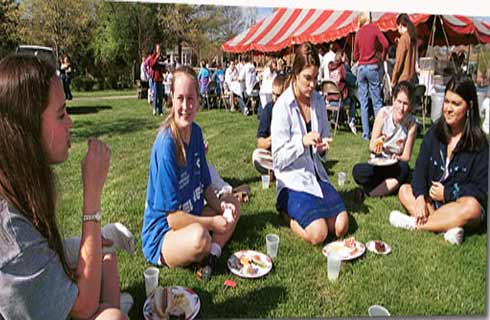妇女与性别研究文学硕士
Master of Arts in Women and Gender Studies

学历文凭
Masters Degree

专业院系
Faculty of Arts and Science

开学时间

课程时长

课程学费

国际学生入学条件
Have a minimum grade point average of 3.00 (based on 4.00 scale) on the last 20 graded university-level term courses OR calculated on the most recently completed master's degree if the applicant is applying for another master's degree
All proof of English proficiency must be provided on official academic transcripts or standardized test score reports. Standardized test scores must be valid and verifiable. Successful completion of a baccalaureate or master's degree at a recognized institution where the language of instruction is English. Test of English as a Foreign Language (TOEFL (iBT) or TOEFL iBT Home Edition) with a minimum total score of 86. Academic International English Language Testing System (IELTS or IELTS Online) test, taken within the last two years, with a minimum overall score of 6.5, and a minimum score of 6.0 in each band. IELTS One Skill Retake results are accepted. Cambridge English Qualifications: C2 Proficiency (C2 Proficiency), with a minimum score of 176, and a minimum 176 in each subscore. Canadian Academic English Language (CAEL or CAEL Online) assessment, taken within the last two years, with a minimum overall score of 70. Duolingo with a minimum score of 115.
IDP—雅思考试联合主办方

雅思考试总分
6.5
了解更多
雅思考试指南
- 雅思总分:6.5
- 托福网考总分:86
- 托福笔试总分:160
- 其他语言考试:Academic Pearson Test of English (PTE), taken within the last two years, with a minimum overall score of 63.
CRICOS代码:
申请截止日期: 请与IDP顾问联系以获取详细信息。
课程简介
The department of Women & Gender Studies at the University of Lethbridge offers a dynamic, inter-disciplinary and rigorous Master of Arts in Women & Gender Studies. Our faculty also teach and supervise students in the CSPT program (MA and PhD levels). We have expertise in the following areas:<br><br>Gender and Global Migration<br>Reproductive Justice<br>Critical Race & Sexualities in Law & Culture<br>Marriage & Kinship<br>Feminist Constitutionalism<br>Human Rights & Political Economies<br>Indigenous Women & Settler Colonialism<br>Women & Spirituality<br>Our faculty is united through common themes in their research agendas, most notably interrogating issues of power embedded in and exercised by national states within complex transnational relationships. Whether our research is conducted locally, nationally or globally, by ourselves on individual projects that are small scale, or in partnership with national and transnational projects, we consistently disseminate our work through networks of feminist and allied scholars, and build strong working relationships across disciplines.
相关申请
 预科
预科 奖学金
奖学金 实习机会
实习机会 在校学习
在校学习 跨境学习
跨境学习 校园授课-线上开始
校园授课-线上开始 在线/远程学习
在线/远程学习
关于莱斯布里奇大学

莱斯布里奇大学是一所位于加拿大艾伯塔省的公立综合性研究型大学,提供150多门本科课程和50门研究生课程。在2021年加拿大本科大学排名中莱斯布里奇大学位于第二,是加拿大高等教育中的一支有影响力的力量。在提供卓越的学习环境、研究创新以及国际课程和机会方面处于领先地位。该大学的莱斯布里奇校区风景如画,占地500英亩,拥有世界一流的设施。包括新建的、最先进的''科学共同体''大楼、加拿大行为神经科学中心以及艾伯塔省水与环境科学大楼。该大学还在充满活力和热情的卡尔加里市市中心地区(Calgary)设有一个校园,适合想要沉浸于加拿大生活或学习工作的学生。莱斯布里奇大学致力于通过提供出色的教学、现实世界的研究、与教授和讲师的紧密合作以及大量的娱乐和课外活动,创造超出学习者教育和个人需求的学术环境。莱斯布里奇大学的学生将发现自己充满优势,可以在学术上取得卓越成就或进入前景广阔的专业或研究领域。
本校相关课程

美术学士-艺术(艺术史和博物馆研究)
学历文凭
Bachelor Degree
开学日期
课程费用总额


美术学士-艺术(艺术工作室)
学历文凭
Bachelor Degree
开学日期
课程费用总额


原住民健康科学学士学位
学历文凭
Bachelor Degree
开学日期
课程费用总额


吸毒咨询健康科学学士学位
学历文凭
Bachelor Degree
开学日期
课程费用总额


农业生物技术理学学士
学历文凭
Bachelor Degree
开学日期
课程费用总额


农业研究学士学位
学历文凭
Bachelor Degree
开学日期
课程费用总额

其他相关课程

妇女和性别研究文学士学位(3年)
 劳伦森大学
劳伦森大学学历文凭
Bachelor Degree
开学日期
课程费用总额


妇女和性别研究文学士学位
 温尼伯大学
温尼伯大学学历文凭
Bachelor Degree
开学日期
课程费用总额


土著研究哲学博士
 特伦特大学
特伦特大学学历文凭
Ph.D.
开学日期
课程费用总额


文化研究哲学博士
 特伦特大学
特伦特大学学历文凭
Ph.D.
开学日期
课程费用总额


性别与妇女研究文学士学位
 特伦特大学
特伦特大学学历文凭
Bachelor Degree
开学日期
课程费用总额


文化研究文学士
 特伦特大学
特伦特大学学历文凭
Bachelor Degree
开学日期
课程费用总额


























